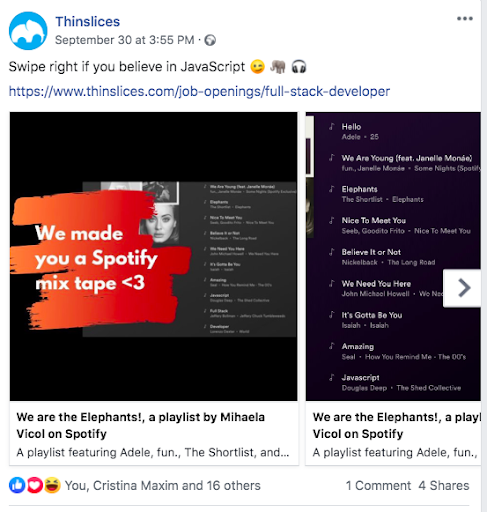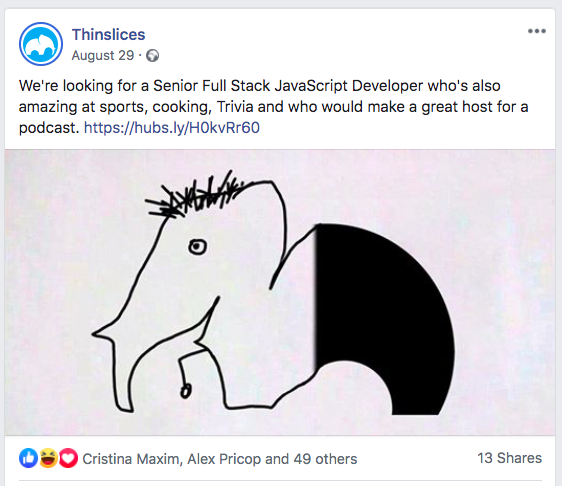Hiring React.JS Developers - Best Practices & Job Description Template
TECH TEAMS, REACT.JS | 13 Dec 2019
According to the 2019 Stack Overflow Developer Survey, 74.5% of 90,000 participants consider React.js to be “the most loved and most wanted web framework”. Flexible and efficient for building UI, React.js makes app development a lot more fun. In June 2018, it hit a new high in the job market, having been mentioned in more than 28% of IT-based job posts. With over 980k websites around the world currently using React.js, it is safe to assume that the future’s brighter than ever for today’s React.js developer.
Given the increasing demand and popularity of the framework, all of the above-mentioned stats impact a company’s ability to hire top talent. In this article, we will focus on several fundamental best practices when attempting to hire React.js developers, based on our own experience. We will cover basic guidelines on how to do it right, what mistakes to avoid, and, in the end, we will conclude with our view of the ideal job description template.
Build Your Company’s Resume
As the line between recruitment and marketing blurs away, the smartest companies stand out through authenticity and boldness, constantly sharing with the world how it truly “feels” to work with them. Insights into the company culture, daily activities, colleague stories and career progression of ‘ninjas’ are widely sought after by job-seekers.
Since we’re talking about React.js developers, your focus as a brand and business should be to communicate with prospects (and hopefully, future employees) as humanly as possible. Your resume should highlight perks and benefits in the company. However, it’s equally important to be digitally present. An active presence on social media is fundamental because it allows you to share experiences that might resonate with people eager to join your team.
Customize your company’s resume with brand advocacy, allowing employees to have a voice. This will not only strengthen your culture, but it will also make you seem honest in the eyes of your ideal candidates. Give people freedom of speech, encourage them to share their working experience and let them share thoughts and spread the word by attending events, conferences, and workshops. Last but not least, leverage whatever makes your company “special” - flexible schedules, great work equipment, comfortable work environment, training opportunities, etc.
Check for Culture Fit Candidates
Hiring a React.js developer just because your company desperately needs those skills is one of the worst mistakes you can make. It is important to seek out culture fit candidates that go beyond just the skillset; people who want you to succeed as well. For us, this is one of the most important hiring criteria.
Someone that doesn’t fit your company culture will become a rotten apple quickly. Culture fit candidates in the world of software development are a rare breed - they’re destined for greatness. Let’s not forget that React.js is still in its infancy, meaning that you should stop looking for unicorns and focus on hiring people with actual potential to become unicorns. A great strategy would be to search for JavaScript developers with a genuine interest to learn React.js. Where there’s passion, there should be drive; and if you’re lucky enough to find a developer who has both, there’s nothing he or she can’t do.
Before posting a job or having HR go on a hunting trip, your company’s website should speak for itself. It should give candidates all the right answers while also preparing them for what you have to offer. What are your company’s values? Are you looking for team players with an entrepreneurial attitude? Do you want candidates to have an agile mindset? Having a “company handbook” helps cut through the noise.
Armed with a killer company resume and a list of culture fit candidates, the next step is to screen those candidates before opening the doors to the kingdom. It’s time to sit down with HR and align a set of questions for your future React.js rockstars. Don’t call them in for an interview just yet!
One of the major differences between React.js developers and Angular.js developers is that React is just a UI component library. In the first phase, your future rockstar will work with components, not apps. He or she will have to fit those components to see whether or not they’re a match. With Angular.js, it’s not that much of a trouble as everything is given. As a consequence, when screening candidates, you might want to look for developers with a LEGO mindset; developers who genuinely like to fiddle around, try and test, do puzzles, and not someone who expects everything to be offered on a silver platter.
Candidates with technical know-how are great, but given that performance and optimization are key React features, your focus should be on developers who enjoy deep thinking. In the interview phase, one question might be: “Do you often attend coding events or challenging workshops? If “yes”, what was the last event you’ve participated in?” But if you want to adopt a friendlier attitude, you can just ask “Do you play chess?”
Use 21st-Century Recruitment Tools
Recruiting React.js developers in today’s digital world should center on strategies that appeal to their technical, LEGO-like nature. The best advice here would be to ditch the old-fashioned methods and adopt tactics that speak their language. Start by using online channels to their maximum potential with marketing campaigns that don’t scream “We want to hire you”.
For example, rather than use plain text in a Facebook post followed by an image with “React.js WANTED”, we made a Spotify playlist for our last recruitment ad. We customized it with song titles to deliver our message. Not everyone figured it out, but those who put the pieces (songs) together are genuine deep thinkers we wanted to have on our team.

Using memes in recruitment can also be a snappy strategy to attract top talent. The more personal you get, the better chances you have to make your ideal candidate's heart skip a beat. 
When using social media as a recruitment tool for developers in general, not just for React.js, all your efforts should be channeled on personalization. In-mail LinkedIn campaigns are superficial and expensive, and although they might work for enterprises like Google or UiPath, it’s not worth the money when you’re a fish in a shark tank looking to hire locally. Developers are smart and many won’t even open an in-mail if they see it’s “Sponsored”. To them, it’s just another impersonal, dull job post.
Organize a Hackathon
Take your recruitment process to the next level by organizing a hackathon to retain top talent. While interviews, social media campaigns, and aptitude tests are great for screening candidates, a hackathon can have a more direct impact because at its core lies a competition that will help you assess a wealth of skills in potential candidates: team spirit, programming abilities, problem-solving skills, collaboration skills, competitiveness, creativity, and the list goes on.
How do you organize a hackathon? Get involved in the community and partner up with a tech conference (preferably in your city) to make it all happen. Next, settle on a prize. Without too much chit-chat, it’s obvious that a cash prize works better than anything else. And last but not least, choose a theme/topic for your hackathon.
How about “A Game of Components”? 
Hackathons are great because they allow you to judge a candidate’s skills from an outsider’s perspective. The developers are there to win a prize. They’re fully aware your hackathon has hidden purposes, but are not bothered by that because you’re offering them a customized experience; you give them an opportunity to find a solution to a problem, challenge their abilities, socialize with other developers, and ultimately, have fun on a Saturday with another 50 people sharing the same passion or skills.
Refine Your Job Description - Develop a Killer Template
Before posting a job on your company website, it pays to consult with both HR and marketing to refine the job description. Steer clear of vague statements and break down your template into 5 core sections:
Section #1
Short job description (no more than 100 words): this is where you state that you’re looking to hire a React.js developer with X years of experience. Add a few lines about preferable skills and main responsibilities.
Section #2 - Essentials
- Location:
- Employment type: On site, full time
- Projects: Open-source software
- Company size: 70+
- Team size:
Section #3 - Specs
- Workload: 100%
- Workweek: 40h/week
- Holiday: 21 days
- Emergency days: Unlimited
- Flexible work: Yes
- Life support: 2 lunches, fruit in-house, unlimited coffee
Section #4 - Work methodology
- Think. Debate. Code
- Code Reviews
- Pair Programming
- Unit Testing
- Version Control System
- Agile Methodology: Scrum, Kanban, Developer Anarchy
- Freedom to choose tools: Absolutely!
Section #5 - Job requirements
Must- JavaScript
- React
- HTML, CSS
- State management libraries (e.g. Redux, Apollo
Nice to have
- RESTful APIs
- GraphQL APIs
- Data structure libraries (e.g., Immutable.js)
- Component-based architecture
Section #6 - Optional (keywords defining your company, perks, benefits, values)
Whatever makes your company special, interesting, different should be mentioned in this section.
- Local management team
- Strong values
- Incredible parties
- Memorable workshops
- Continuous learning & development
- Medical insurance
- Awesome workplace
Final Thoughts
Whether we like it or not, a standard recipe for hiring the best React.js developers does not exist. In our case, we’ve made sure that our HR & marketing teams collaborate well and often. This enables them to create an end-to-end employee experience that can help send the right message about our company and attract the React.js developers we want.
The good news: there are great strategies out there that you can leverage to make the process run smoothly from beginning to end. Having someone dedicated to managing employer branding campaigns would be ideal; and if that someone knows a bit of HR, even better. Happy hunting!
Editor's Note: This is a guest post by Paula Clapon, Marketing & Employer Branding Specialist at Thinslices. Thinslices is a full-service product development agency, working on high-intensity development projects with corporate innovation groups and startups.